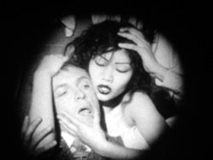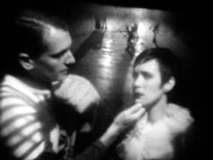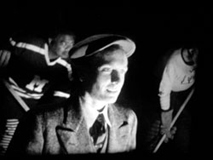Cowards Bend the Knee (Guy Maddin, 2003)
 Ice hockey, incest, abortion, revenge, and voyeurism
provide some of the elements that make up Cowards
Bend the Knee, a serialized and satirical melodrama that plays out under the
close scrutiny of a microscope. Created by Canadian retro-auteur Guy Maddin, it
features his cheeky brand of expressionism in what might be the fullest
expression of it that heís yet achieved. A slightly more sedate version of the
style utilized in his justly acclaimed short The Heart of the World is combined with the thematic obsessions most
obviously present in his best feature film, Careful, to create an experience that, like the best of Maddinís
work, pays homage to the roots of film history while giving the impression that
itís pushing forward cinemaís cutting-edge. Divided into ten short chapters,
this pseudo-silent (sound effects are present even if dialogue isnít) is made
to look like a tattered old print of a lost movie from the pre-sound era. The
images donít move at a consistent speed, the screen is intentionally scratched
and blurred at times (most humorously while the text of the longest intertitles
is displayed), and there is a plethora of fisheye and kaleidoscope lenses
employed throughout. To those not familiar with Maddinís work, this style
might be initially off-putting, but his technique has the odd effect of making
you appreciate his use of cinematic technique more than you might in a more
conventionally competent work.
Ice hockey, incest, abortion, revenge, and voyeurism
provide some of the elements that make up Cowards
Bend the Knee, a serialized and satirical melodrama that plays out under the
close scrutiny of a microscope. Created by Canadian retro-auteur Guy Maddin, it
features his cheeky brand of expressionism in what might be the fullest
expression of it that heís yet achieved. A slightly more sedate version of the
style utilized in his justly acclaimed short The Heart of the World is combined with the thematic obsessions most
obviously present in his best feature film, Careful, to create an experience that, like the best of Maddinís
work, pays homage to the roots of film history while giving the impression that
itís pushing forward cinemaís cutting-edge. Divided into ten short chapters,
this pseudo-silent (sound effects are present even if dialogue isnít) is made
to look like a tattered old print of a lost movie from the pre-sound era. The
images donít move at a consistent speed, the screen is intentionally scratched
and blurred at times (most humorously while the text of the longest intertitles
is displayed), and there is a plethora of fisheye and kaleidoscope lenses
employed throughout. To those not familiar with Maddinís work, this style
might be initially off-putting, but his technique has the odd effect of making
you appreciate his use of cinematic technique more than you might in a more
conventionally competent work.
 I saw Cowards projected in a
traditional theater, but itís being exhibited mainly at festivals
(including New Yorkís Tribeca Film Festival) using peephole-like nickelodeon
installations. I imagine it would prove interesting either way, since
Maddinís visual inventions occur frequently enough that even a glimpse of the
film would inspire further curiosity. The directorís overriding quest seems to be to make
modern audiences rediscover the fundamental thrills of watching a movie. To
radically alter the mode of viewing makes the experience a special one again
(and one that's informed by the knowledge that this is how films used to
be viewed), but also on a
conceptual level, the peephole is an entirely appropriate viewing device for a
movie so obsessed with fetishistic voyeurism. The overall confessional tone of
the film and the wild pastiche of the plot provide numerous opportunities for
the viewer to consider their role as cinematic Peeping Tom. Images throughout,
such as the opening's microscope, the two-way mirrors and air vents in the
bordello/beauty salon that provides the movieís main setting, the crowds at
the sports arena, and shots of characters peeking through doorways, force the
viewer to consider fine line between spectatorship and invasion of privacy. As in Careful,
questionable, vaguely incestuous familial relationships further ponder the issue
of privacy. The sight of a woman quietly fondling her lover in front of her
blind grandmother or a prostitute having sex with a customer while her baby sits
on her bed create an environment rife with an uncomfortable mingling of public
and private behavior, a concern at the center of any confessional film to some
degree.
I saw Cowards projected in a
traditional theater, but itís being exhibited mainly at festivals
(including New Yorkís Tribeca Film Festival) using peephole-like nickelodeon
installations. I imagine it would prove interesting either way, since
Maddinís visual inventions occur frequently enough that even a glimpse of the
film would inspire further curiosity. The directorís overriding quest seems to be to make
modern audiences rediscover the fundamental thrills of watching a movie. To
radically alter the mode of viewing makes the experience a special one again
(and one that's informed by the knowledge that this is how films used to
be viewed), but also on a
conceptual level, the peephole is an entirely appropriate viewing device for a
movie so obsessed with fetishistic voyeurism. The overall confessional tone of
the film and the wild pastiche of the plot provide numerous opportunities for
the viewer to consider their role as cinematic Peeping Tom. Images throughout,
such as the opening's microscope, the two-way mirrors and air vents in the
bordello/beauty salon that provides the movieís main setting, the crowds at
the sports arena, and shots of characters peeking through doorways, force the
viewer to consider fine line between spectatorship and invasion of privacy. As in Careful,
questionable, vaguely incestuous familial relationships further ponder the issue
of privacy. The sight of a woman quietly fondling her lover in front of her
blind grandmother or a prostitute having sex with a customer while her baby sits
on her bed create an environment rife with an uncomfortable mingling of public
and private behavior, a concern at the center of any confessional film to some
degree.
 Iíve not really attempted to describe the plot of Cowards
because I donít believe Iíd do a very good job of making it sound like
anything other than a silly romp. The ridiculous elements present in the film
are treated with a mixture of camp and sincerity that makes them emotionally
believable in a way that might be difficult to convey in words. Because Maddin
has a firm command of the medium, heís able to hold audience interest despite
a tone that constantly, gleefully runs back and forth across the line that lies between
hilarious and profound. I canít think of many other filmmakers that possess
the audacity to name the lead character in a film after himself and then have
that character fall in love with an oversexed girl named Meta. When Maddin does
this, he piles it on thick, even going so far in one Meta-moment as to describe
the way that ďGuyĒ loves her coyness and sense of nostalgia.
Perhaps itís needless to say that the filmís oversexed lesson about
the possible temptations of family life might not be applicable to everyone, but
itís such an undeniably intimate statement that itís difficult to imagine
the viewer that wouldnít find anything of worth in Cowards Bend the Knee.
Iíve not really attempted to describe the plot of Cowards
because I donít believe Iíd do a very good job of making it sound like
anything other than a silly romp. The ridiculous elements present in the film
are treated with a mixture of camp and sincerity that makes them emotionally
believable in a way that might be difficult to convey in words. Because Maddin
has a firm command of the medium, heís able to hold audience interest despite
a tone that constantly, gleefully runs back and forth across the line that lies between
hilarious and profound. I canít think of many other filmmakers that possess
the audacity to name the lead character in a film after himself and then have
that character fall in love with an oversexed girl named Meta. When Maddin does
this, he piles it on thick, even going so far in one Meta-moment as to describe
the way that ďGuyĒ loves her coyness and sense of nostalgia.
Perhaps itís needless to say that the filmís oversexed lesson about
the possible temptations of family life might not be applicable to everyone, but
itís such an undeniably intimate statement that itís difficult to imagine
the viewer that wouldnít find anything of worth in Cowards Bend the Knee.
* * * *
04-16-03
Jeremy Heilman